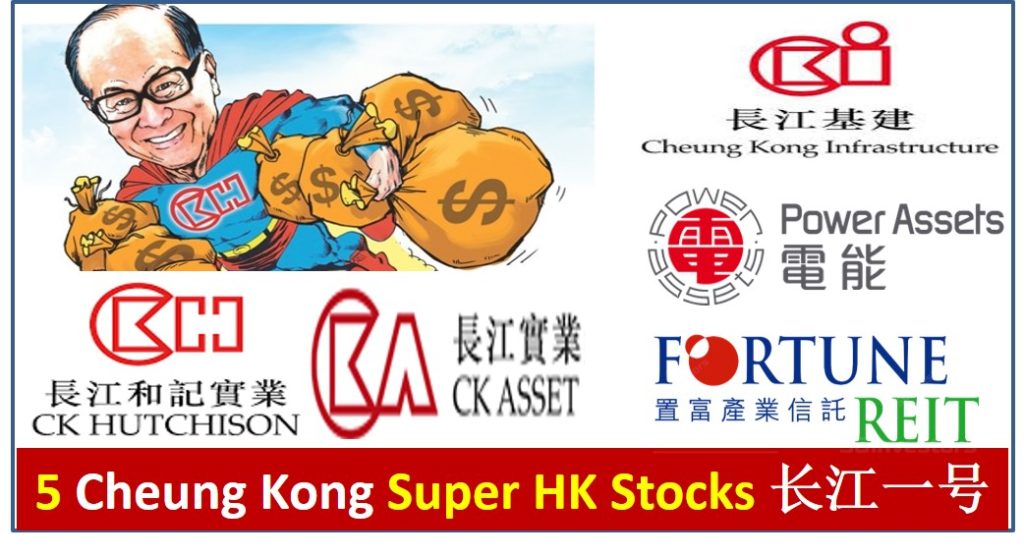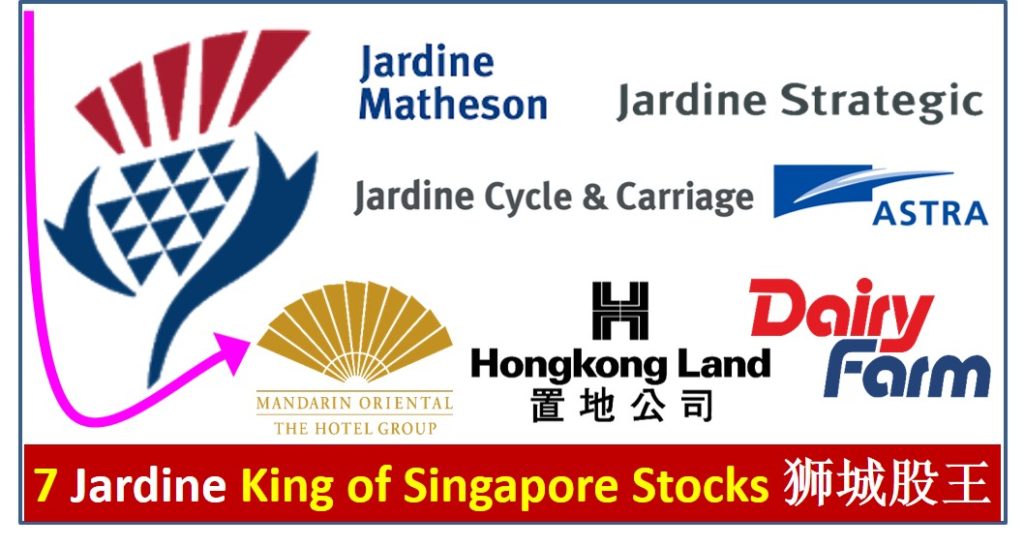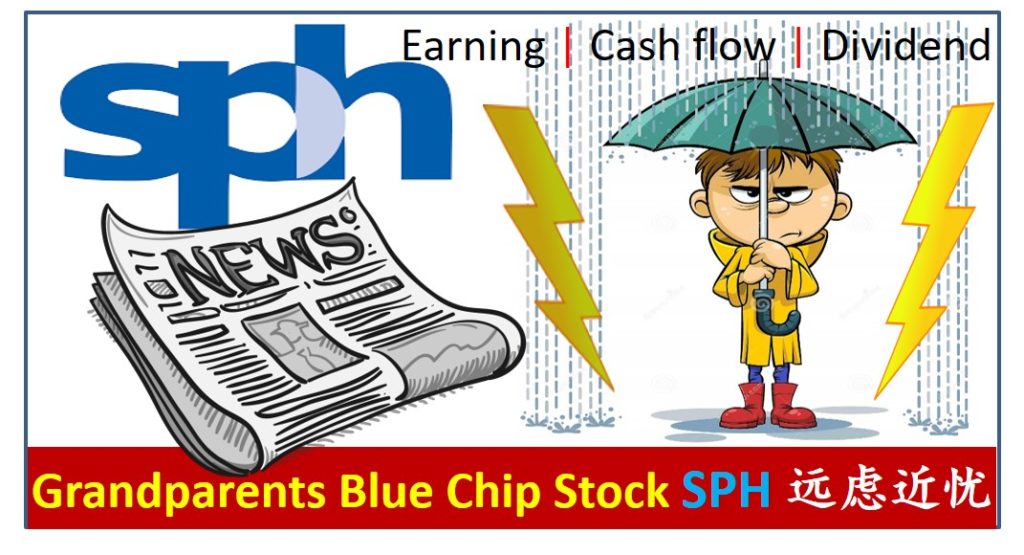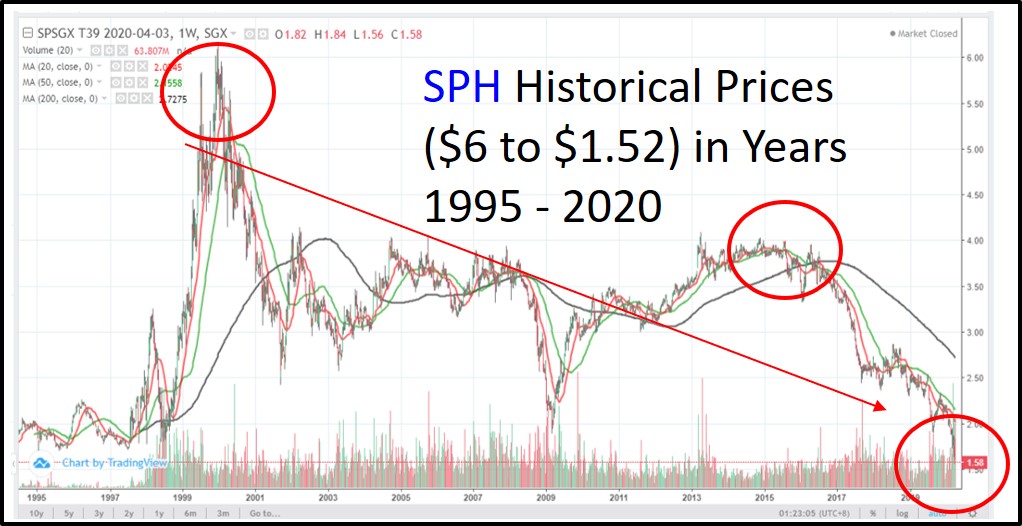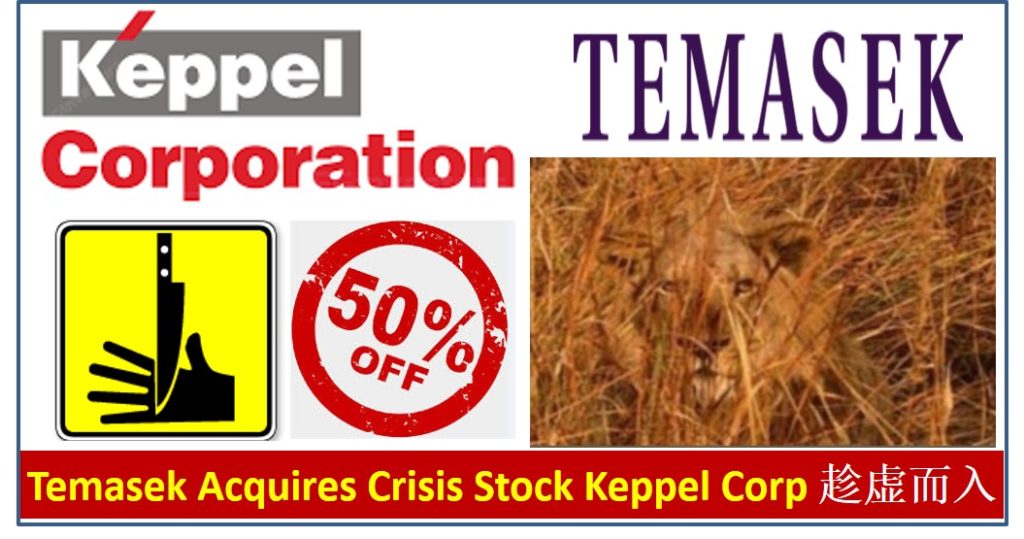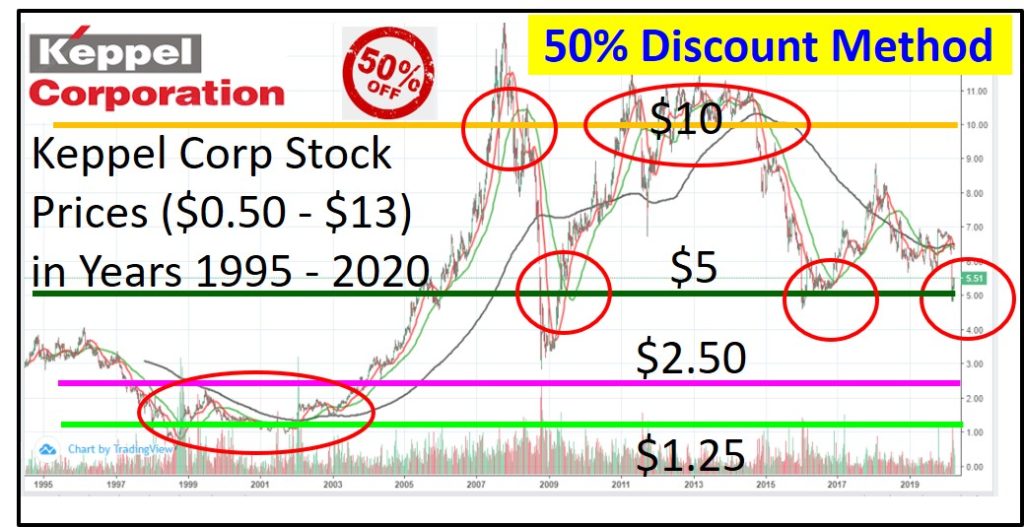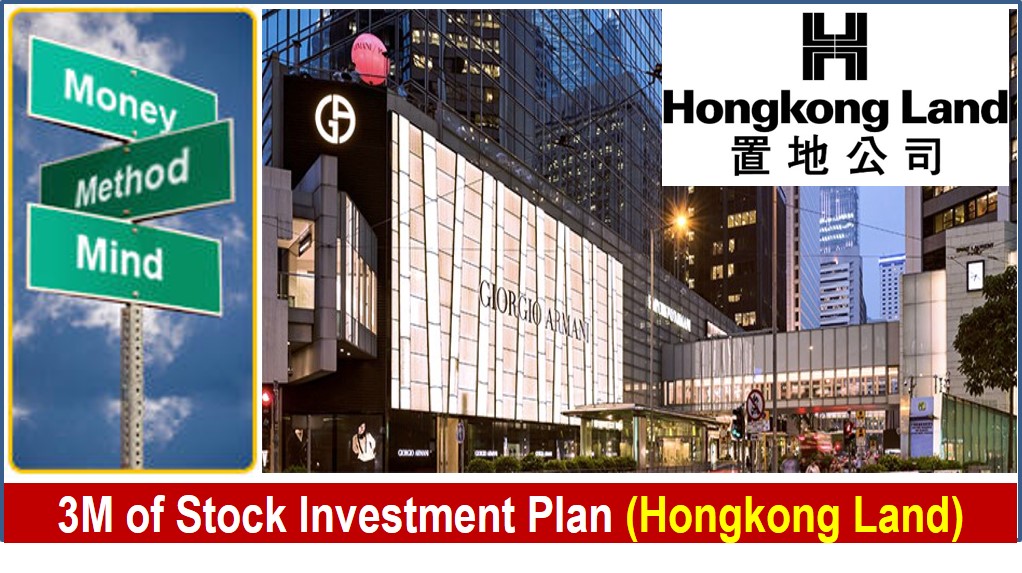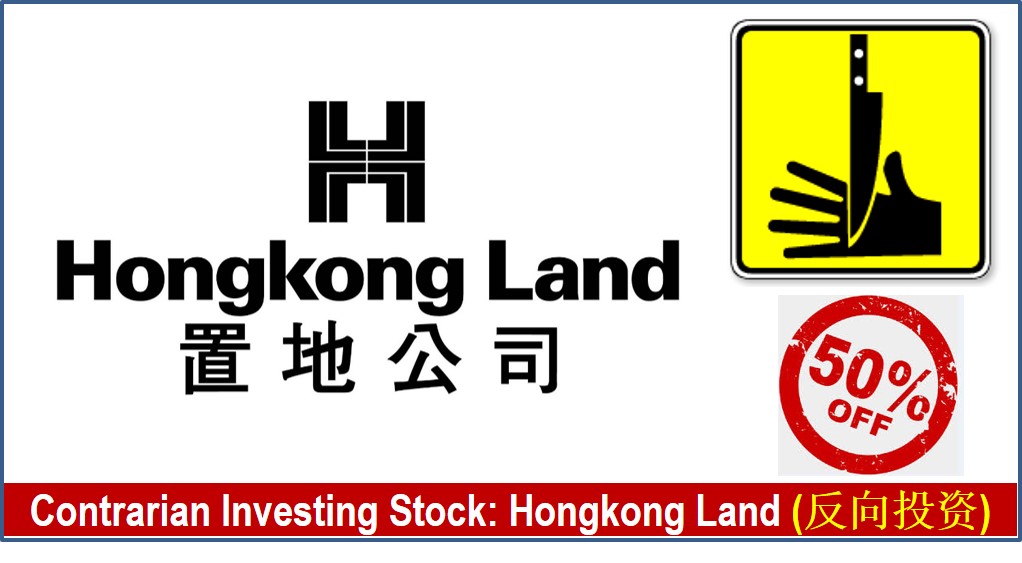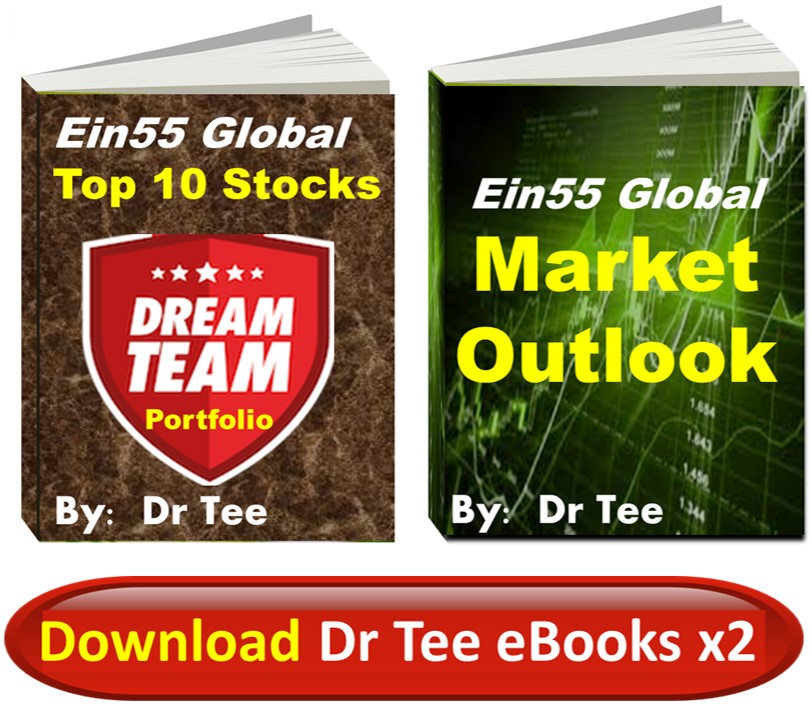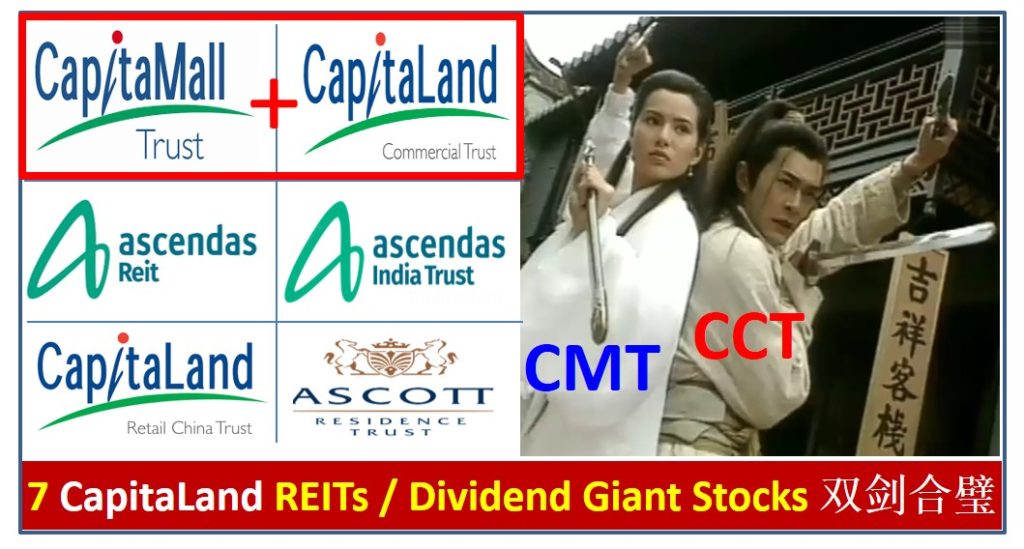
CapitaLand is Temasek property giant stock, having 2 giant Singapore REITs: CapitaLand Mall Trust (CMT) and CapitaLand Commercial Trust (CCT). Many Singapore investors like REITs for passive income generation through quarterly dividend payment. After the announcement of merging, both REITs suffer about 40% price correction during global stock crisis with Coronavirus fear, dividend yields are more than 6%, attractive for long term investors.
Some potential REIT investors would like to know should they invest in CMT or CCT before the merging, which one has more potential, or should they wait until the merging of 2 REITs into CapitaLand Integrated Commercial Trust (CICT), the largest Singapore REIT by June 2020.
Read the article further to find out the critical answers for CMT and CCT, not learning only 2 REITs but all 7 stocks related to parent stock CapitaLand, including 4 REITs and trusts in the same group: Ascendas REIT, Ascott Residence Trust, Ascendas India Trust and CapitaLand Retail China Trust.
==============================
CapitaLand is the largest property developer in Asia (after merging with Ascendas and Singbridge), becoming a key Temasek property investment portfolio. CapitaLand has total of 6 REITs / Business Trust in Singapore:
1) CapitaLand (SGX: C31) – Singapore Property Giant Stock
2) CapitaLand Mall Trust, CMT (SGX: C38U) – Retail REIT Giant Dividend Stock
3) CapitaLand Commercial Trust, CCT (SGX: C61U) – Office REIT Giant Dividend Stock
4) Ascendas REIT (SGX: A17U) – Industrial REIT Giant Dividend Stock
5) Ascott Residence Trust (SGX: HMN) – Hospitality REIT Dividend Stock
6) Ascendas India Trust (SGX: CY6U) – Business Trust Dividend Stock
7) CapitaLand Retail China Trust (SGX: AU8U) – Retail REIT Dividend Stock
In summary, all 7 CapitaLand group of stocks have reasonable strong business fundamental, all 6 REITs / trusts may be considered for dividend investing but only 3 of them are giant REITs stocks (based on Dr Tee giant criteria): CMT, CCT and Ascendas REIT. Sibling stocks of Ascott Residence Trust, Ascendas India Trust and CapitaLand Retail China Trust are relatively weaker, more suitable for pure dividend investing but subject to cyclic stock market risk (eg. capital loss during global stock crisis with limited long term growth). Parent stock, Capitaland, is a blue chip stock, behaving as if a fund with all the subsidiary stocks, more suitable for low capital investor who needs diversification.
There are 30 STI index component stocks including CapitaLand Mall Trust and CapitaLand Commercial Trust (investor has to focus only on giant stocks for investing):
DBS Bank (SGX: D05), Singtel (SGX: Z74), OCBC Bank (SGX: O39), UOB Bank (SGX: U11), Wilmar International (SGX: F34), Jardine Matheson Holdings JMH (SGX: J36), Jardine Strategic Holdings JSH (SGX: J37), Thai Beverage (SGX: Y92), CapitaLand (SGX: C31), Ascendas Reit (SGX: A17U), Singapore Airlines (SGX: C6L), ST Engineering (SGX: S63), Keppel Corp (SGX: BN4), Singapore Exchange (SGX: S68), HongkongLand (SGX: H78), Genting Singapore (SGX: G13), Mapletree Logistics Trust (SGX: M44U), Jardine Cycle & Carriage (SGX: C07), Mapletree Industrial Trust (SGX: ME8U), City Development (SGX: C09), CapitaLand Mall Trust (SGX: C38U), CapitaLand Commercial Trust (SGX: C61U), Mapletree Commercial Trust (SGX: N2IU), Dairy Farm International (SGX: D01), UOL (SGX: U14), Venture Corporation (SGX: V03), YZJ Shipbldg SGD (SGX: BS6), Sembcorp Industries (SGX: U96), SATS (SGX: S58), ComfortDelGro (SGX: C52).
By law, 90% of REIT incomes has to be redistributed back to shareholders in the form of dividend, therefore it is a popular passive income generator. If a REIT pay 4 times yearly, an investor with 3 REITs could receive 12 payments yearly, helping to offset monthly expenses. When return from monthly dividend is more than monthly expenses, an investor would become financial free. However, certain REITs may not pay consistent dividend due to unstable business and a few could even go bankrupt if not properly managed. Business Trust (eg. Ascendas India Trust) seems similar to REIT but it is not required by law to pay dividend, therefore creating an uncertainty in the future which dividend payment is not guaranteed.
In this article, we will focus on 2 giant REITs, CMT and CCT which will be merged soon. Sharing is for educational purpose, please make your own decision. Before merging announcement, CMT performs relatively better than CCT from overall investing consideration. So, CCT investors would benefit more than CMT investor.
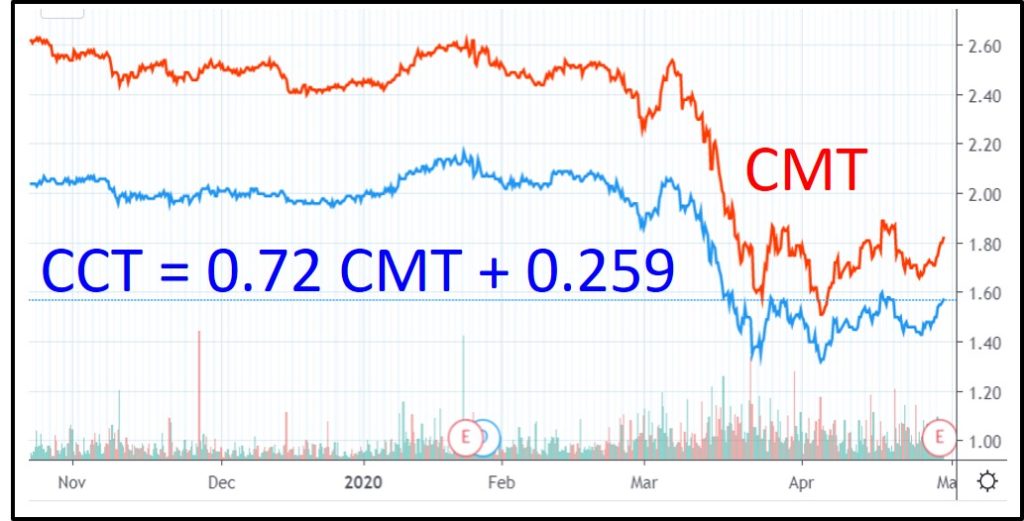
The merging deal is for CMT to acquire CCT by exchange every share of CCT with 0.72 share of CMT + cash $0.259/share. Since the announcement from 22 Jan 2020 until today, CMT and CCT share prices are closely correlated as mirror image with this formula:
CCT = 0.72 CMT + 0.259
It means after the merging announcement, there is not much difference now as CMT and CCT prices movement of stocks follow the equation above closely. Even if an investor is interested in CMT, the decision of whether to invest now or after official merging in June 2020, should be based on stock market outlook, not expecting any drastic change in share price after the official merging. In fact, over the past 2 months of global stock crisis, both CMT and CCT dropped by about 40% in share prices, even after recovering in the last few weeks, CMT is still at low optimism < 25%. In general, before merging, CMT is more defensive while CCT is more cyclic, therefore future CICT REIT may behave in between both REITs, more cyclic than CMT, more defensive than CCT.
Coronavirus pandemic has affected both CMT and CCT as some tenants may not pay rents on time but this could be recovered later when Coronavirus has ended or fading away over the next few months. Occupancy rates of both REITs are high (about 99%), any withdrawal by tenant (eg. a few weaker F&B or consumer companies may not be able to sustain) may be quickly replaced by new tenant but rental increase would be limited. If Coronavirus is not a long term issue (under the worst case, vaccine could be developed in about 1 year), major correction in share prices for either CMT or CCT could be an opportunity to accumulate with dividend yield around 6%. Assuming the worst case of losing 20% tenants (dropping from 99% to 80% occupancy) if Coronavirus may stay for 1 more year with 20% people in the world staying at home during lockdown, average dividend yield is correct to around 5%, still better than keeping cash in bank with only 1% dividend. When crisis is over, an investor could enjoy the capital gains with potential share price appreciation due to market greed.
Before merging, CMT and CCT already has joint portfolio, eg. Raffles City (40% CMT, 60% CCT). After merging, the new CICT REIT would dominate both retail shopping malls and offices in Singapore, having more capital to expand in overseas. However, inorganic growth through more acquisition (eg. overseas properties) may or may not add value to CICT as it depends on expertise of REIT manager, able to find high quality properties at discounted prices (eg. during economic crisis), adding more potential to DPU (dividend per unit). Over expansion sometimes may result in higher risk (higher gearing ratio, which would become higher after merging as CMT has to pay some cash to CCT investors) but acceptable for CICT with dual level sponsors of CapitaLand and Temasek.
There could be more merging and acquisition activities during the global stock crisis. A giant stock does not need to be the “biggest” company, more importantly, strong in fundamental with growing business, therefore even a small company could be a giant stock.
A smart investor may consider only the strongest subsidiary giant stock of CapitaLand group, which is protected by the sponsor CapitaLand, which is further protected by another bigger sponsor, Temasek. This implies for the giant stock to fail (eg. go bankrupt), it has to hurt CapitaLand or even Temasek first. However, safer stocks may not be the best choice for investment as growth are limited.
There are 52 REITs and Business Trusts stocks including CapitaLand Mall Trust and CapitaLand Commercial Trust (investor has to focus only on giant stocks for investing):
AIMS APAC Reit (SGX: O5RU), ARA Hospitality Trust USD (SGX: XZL), ARA LOGOS Logistics Trust (SGX: K2LU), Ascendas Reit (SGX: A17U), Ascendas India Trust (SGX: CY6U), Ascott Trust (SGX: HMN), Asian Pay Tv Trust (SGX: S7OU), BHG Retail Reit (SGX: BMGU), CapitaLand Commercial Trust (SGX: C61U), CapitaLand Mall Trust (SGX: C38U), CapitaLand Retail China Tr (SGX: AU8U), CDL Hospitality Trust (SGX: J85), Cromwell Reit EUR (SGX: CNNU), Cromwell Reit SGD (SGX: CSFU), Dasin Retail Trust (SGX: CEDU), Eagle Hospitality Trust USD (SGX: LIW), EC World Reit (SGX: BWCU), Elite Commercial Reit (SGX: MXNU), ESR-REIT (SGX: J91U), Far East Hospitality Trust (SGX: Q5T), First Reit (SGX: AW9U), Frasers Centrepoint Trust (SGX: J69U), Frasers Hospitality Trust (SGX: ACV), Frasers Logistics & Commercial Trust (SGX: BUOU), FSL Trust (SGX: D8DU), HPH Trust SGD (SGX: P7VU), HPH Trust USD (SGX: NS8U), IREIT Global (SGX: UD1U), Keppel Infrastructure Trust (SGX: A7RU), Keppel Pacific Oak US REIT (SGX: CMOU), Keppel DC Reit (SGX: AJBU), Keppel Reit (SGX: K71U), Lendlease Reit (SGX: JYEU), Lippo Malls Trust (SGX: D5IU), Manulife Reit (SGX: BTOU), Mapletree Commmercial Trust (SGX: N2IU), Mapletree Industrial Trust (SGX: ME8U), Mapletree Logistics Trust (SGX: M44U), Mapletree North Asia Commercial Trust (SGX: RW0U), NetLink NBN Trust (SGX: CJLU), OUE Commercial Reit (SGX: TS0U), ParkwayLife Reit (SGX: C2PU), Prime US Reit (SGX: OXMU), RHT HealthTrust (SGX: RF1U), Sabana Reit (SGX: M1GU), Sasseur Reit (SGX: CRPU), Soilbuild Business Space Reit (SGX: SV3U), SPH Reit (SGX: SK6U), Starhill Global Reit (SGX: P40U), Suntec Reit (SGX: T82U), United Hampshire US Reit (SGX: ODBU).
Learn from Dr Tee 4hr Free investment course on global dividend giant stocks to collect passive income during low optimism in stock crisis, then enjoying capital gains with growing share prices when crisis is over.
Learn further from Dr Tee valuable 7hr Online Course, both English (How to Discover Giant Stocks) and Chinese (价值投资法: 探测强巨股) options, specially for learners who prefer to master stock investment strategies of over 100 global giant stocks at the comfort of home.
You are invited to join Dr Tee private investment forum (educational platform, no commercial is allowed) to learn more investment knowledge, interacting with over 9000 members.

